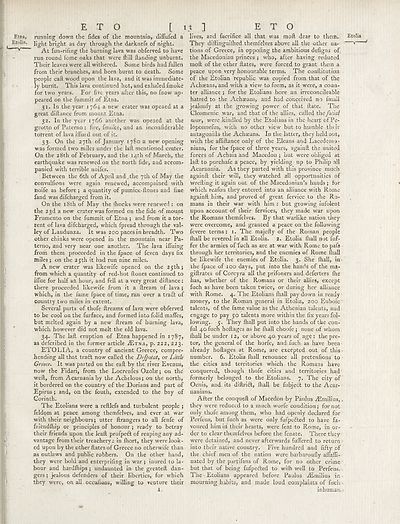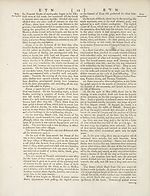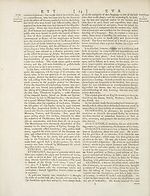Encyclopaedia Britannica > Volume 7, ETM-GOA
(23) Page 13 - ETO
Download files
Complete book:
Individual page:
Thumbnail gallery: Grid view | List view

E T O [
running down the Tides of the mountain, diffufed a
light bright as day through the darknefs of night.
At fun-rifing the burning lava was obferved to have
run round feme oaks that were ftill Handing unburnt.
Their leaves were all withered. Some birds had fallen
from their branches, and been burnt to death. Some
people call wood upon the lava, and it was immediate¬
ly burnt. This lava continued hot, and exhaled fmoke
for two years. For five years after this, no fnow ap¬
peared on the fummit of Etna.
31. In the year 1764 a new crater was opened at a
great diftance from mount Etna.
32. In the year 1766 another was opened at the
grotto of Paterno : fire, fmoke, and an inconfiderable
torrent of lava iffued out of it.
33. On the 27th of January 17&0 a new opening
was formed two miles under the laft mentioned crater.
On the 28th of February, and the 14th of March, the
earthquake was renewed on the north fide, and accom¬
panied with terrible noifes.
Between the 6th of April and,the 7th of May the
convulfions were again renewed, accompained with
noife as before ; a quantity of pumice-ftones and fine
fand was difeharged from it.
On the 18th of May the (hocks were renewed : on
the 23d a new crater was formed on the fide of mount
Frumento on the fummit of Etna ; and from it a tor¬
rent of lava difeharged, which fpread through the val¬
ley of Laudunza. It was 200 paces in breadth. Two
other chinks were opened in the mountain near Pa¬
terno, and very near one another. The lava iffuing
from them proceeded in the fpace of feven days fix
miles; on the 25th it had run nine miles.
A new crater was likewife opened on the 25th;
from which a quantity of red-hot ftones continued to
iffue for half aft hour, and fell at a very great diftance:
there proceeded likewife from it a ftream of lava;
which, in the fame fpace of time, ran over a tradt of
country two miles in extent.
Several parts of thofe ftreams of lava were obferved
to be cool on the furface, and formed into folid maffes,
but melted again by a new ftream of burning lava,
which however did not melt the old lava.
34. The laft eruption of Etna happened in 1787,
as deferibed in the former article ./Etna, p. 222,223.
ETOLIA, a country of ancient Greece, compre¬
hending all that trad! now called the Defpotat, or Little
Greece. It was parted on the eaft by the river Evenus,
now the Fidari, from the Locrenfes Ozolas; on the
weft, from Acarnaniaby the Achelous; on the north,
it bordered on the country of the Dorians and part of
Epirus; and, on the fouth, extended to the bay of
Corinth.
The Etolians were a reftlefs and turbulent people ;
feldom at peace among themfelves, and ever at war
with their neighbours; utter ftrangers to all fenfe of
friendlhip or principles of honour ; ready to betray
their friends upon the leaft profpedl of reaping any ad¬
vantage from their treachery.- in (hort, they were look¬
ed upon by the other Hates of Greece no otherwife than
as outlaws and public robbers. On the other hand,
they were bold and enterprifing in war; inured to la¬
bour and hardlhips; undaunted in the greateft dan¬
gers ; jealous defenders of their liberties, for which
they were, on all occafions, willing to venture their
1] e t o
lives, and facrifice all that was moft dear to them.: Etolia
They diftinguiftied themfelves above all the other na- v
tions of Greece, in oppqfing the ambitious defigns of
the Macedonian princes ; who, after having reduced
moft of the other ftates, were forced to grant them a
peace upon very honourable terms. The conftitution
of the Etolian republic was copied from that of the
Achseans, and with a view to form, as it were, a coun¬
ter alliance ; for the Etolians bore an irreconcileable
hatred to the Achaeans, and had conceived no fmall
jealaufy at the growing power of that Hate. The
Cleomenic war, and that of the allies, called the facial
war, were kindled by the Etolians in the heart ofPe-
loponnefus, with no other view but to humble their
antagonifts the Achaeans. In the latter, they held out,
with the affiftance only of the Eleans and Lacedemo¬
nians, for the fpace of three years, againft the united
forces of Achaia and Macedon ; but were obliged at
laft to purchafe a peace, by yielding up to Philip all
Acarnania. As they parted with this province much
againft their will, they watched all opportunities of
wrefting it again out of the Macedonian’s hands ; for
which reafon they entered into an alliance with Rome
againft him, and proved of great fervice to the Ro¬
mans in their war with him : but growing infolent
upon account of their fervices, they made war upon
the Romans themfelves. By that warlike nation they
were overcome, and granted a peace on the following
fevere terms: 1. The majefty of the Roman people
(hall be revered in all Etolia. 2. Etolia (hall not fuf-
fer the armies of fuch as are at war with Rome to pafs
through her territories, and the enemies of Rome Avail
be likewife the enemies of Etolia. 3. She (hall, in
the fpace of 100 days, put into the hands of the ma-
giftrates of Corcyra all the prifoners and deferters (he
has, whether of the Romans or their allies, except
fuch as have been taken twice, or during her alliance
with Rome. 4. The Etolians (hall paydown in ready
money, to the Roman general in Etolia, 200 Euboic
talents, of the fame value as the Athenian talents, and
engage to pay 50 talents more within the fix years fol¬
lowing. 5. They (hall put into the hands of the con-
ful 40 fuch hoftages as he (hall choofe ; none of whom
(hall be under 12, or above 40 years of age : the pre-
tor, the general of the horfe, and fuch as have been
already hoftages at Rome, are excepted out of this
number. 6. Etolia (hall renounce all pretenfions to
the cities and territories which, the Romans have
conquered, though thofe cities and territories had
formerly belonged to the Etolians. 7. The city of
Oenis, and- its diftridt, (hall be fubjeft to the Acar-
nanians.
After the conqueft of Macedon by Paulus iEmilius,,
they were reduced to a much worfe condition; for not
only thofe among them, who had openly declared for
Per feus-, but fuch as were only fufpe&ed to have fa¬
voured him in their hearts, were fent to Rome, in or¬
der to clear themfelves before the fenate. There they
were detained, and never afterwards fuffered to return
into their native country. Five hundred and fifty of
the chief men of the nation were barbaroufly aflafli-
nated by the partifans of Rome, for no other crime
but that of being fufpedted to wi(h well to Perfeus..
The ■ Etolians appeared before Paulus iEmilius in
mourning habits, and made loud complaints of fuch
inhuman i
running down the Tides of the mountain, diffufed a
light bright as day through the darknefs of night.
At fun-rifing the burning lava was obferved to have
run round feme oaks that were ftill Handing unburnt.
Their leaves were all withered. Some birds had fallen
from their branches, and been burnt to death. Some
people call wood upon the lava, and it was immediate¬
ly burnt. This lava continued hot, and exhaled fmoke
for two years. For five years after this, no fnow ap¬
peared on the fummit of Etna.
31. In the year 1764 a new crater was opened at a
great diftance from mount Etna.
32. In the year 1766 another was opened at the
grotto of Paterno : fire, fmoke, and an inconfiderable
torrent of lava iffued out of it.
33. On the 27th of January 17&0 a new opening
was formed two miles under the laft mentioned crater.
On the 28th of February, and the 14th of March, the
earthquake was renewed on the north fide, and accom¬
panied with terrible noifes.
Between the 6th of April and,the 7th of May the
convulfions were again renewed, accompained with
noife as before ; a quantity of pumice-ftones and fine
fand was difeharged from it.
On the 18th of May the (hocks were renewed : on
the 23d a new crater was formed on the fide of mount
Frumento on the fummit of Etna ; and from it a tor¬
rent of lava difeharged, which fpread through the val¬
ley of Laudunza. It was 200 paces in breadth. Two
other chinks were opened in the mountain near Pa¬
terno, and very near one another. The lava iffuing
from them proceeded in the fpace of feven days fix
miles; on the 25th it had run nine miles.
A new crater was likewife opened on the 25th;
from which a quantity of red-hot ftones continued to
iffue for half aft hour, and fell at a very great diftance:
there proceeded likewife from it a ftream of lava;
which, in the fame fpace of time, ran over a tradt of
country two miles in extent.
Several parts of thofe ftreams of lava were obferved
to be cool on the furface, and formed into folid maffes,
but melted again by a new ftream of burning lava,
which however did not melt the old lava.
34. The laft eruption of Etna happened in 1787,
as deferibed in the former article ./Etna, p. 222,223.
ETOLIA, a country of ancient Greece, compre¬
hending all that trad! now called the Defpotat, or Little
Greece. It was parted on the eaft by the river Evenus,
now the Fidari, from the Locrenfes Ozolas; on the
weft, from Acarnaniaby the Achelous; on the north,
it bordered on the country of the Dorians and part of
Epirus; and, on the fouth, extended to the bay of
Corinth.
The Etolians were a reftlefs and turbulent people ;
feldom at peace among themfelves, and ever at war
with their neighbours; utter ftrangers to all fenfe of
friendlhip or principles of honour ; ready to betray
their friends upon the leaft profpedl of reaping any ad¬
vantage from their treachery.- in (hort, they were look¬
ed upon by the other Hates of Greece no otherwife than
as outlaws and public robbers. On the other hand,
they were bold and enterprifing in war; inured to la¬
bour and hardlhips; undaunted in the greateft dan¬
gers ; jealous defenders of their liberties, for which
they were, on all occafions, willing to venture their
1] e t o
lives, and facrifice all that was moft dear to them.: Etolia
They diftinguiftied themfelves above all the other na- v
tions of Greece, in oppqfing the ambitious defigns of
the Macedonian princes ; who, after having reduced
moft of the other ftates, were forced to grant them a
peace upon very honourable terms. The conftitution
of the Etolian republic was copied from that of the
Achseans, and with a view to form, as it were, a coun¬
ter alliance ; for the Etolians bore an irreconcileable
hatred to the Achaeans, and had conceived no fmall
jealaufy at the growing power of that Hate. The
Cleomenic war, and that of the allies, called the facial
war, were kindled by the Etolians in the heart ofPe-
loponnefus, with no other view but to humble their
antagonifts the Achaeans. In the latter, they held out,
with the affiftance only of the Eleans and Lacedemo¬
nians, for the fpace of three years, againft the united
forces of Achaia and Macedon ; but were obliged at
laft to purchafe a peace, by yielding up to Philip all
Acarnania. As they parted with this province much
againft their will, they watched all opportunities of
wrefting it again out of the Macedonian’s hands ; for
which reafon they entered into an alliance with Rome
againft him, and proved of great fervice to the Ro¬
mans in their war with him : but growing infolent
upon account of their fervices, they made war upon
the Romans themfelves. By that warlike nation they
were overcome, and granted a peace on the following
fevere terms: 1. The majefty of the Roman people
(hall be revered in all Etolia. 2. Etolia (hall not fuf-
fer the armies of fuch as are at war with Rome to pafs
through her territories, and the enemies of Rome Avail
be likewife the enemies of Etolia. 3. She (hall, in
the fpace of 100 days, put into the hands of the ma-
giftrates of Corcyra all the prifoners and deferters (he
has, whether of the Romans or their allies, except
fuch as have been taken twice, or during her alliance
with Rome. 4. The Etolians (hall paydown in ready
money, to the Roman general in Etolia, 200 Euboic
talents, of the fame value as the Athenian talents, and
engage to pay 50 talents more within the fix years fol¬
lowing. 5. They (hall put into the hands of the con-
ful 40 fuch hoftages as he (hall choofe ; none of whom
(hall be under 12, or above 40 years of age : the pre-
tor, the general of the horfe, and fuch as have been
already hoftages at Rome, are excepted out of this
number. 6. Etolia (hall renounce all pretenfions to
the cities and territories which, the Romans have
conquered, though thofe cities and territories had
formerly belonged to the Etolians. 7. The city of
Oenis, and- its diftridt, (hall be fubjeft to the Acar-
nanians.
After the conqueft of Macedon by Paulus iEmilius,,
they were reduced to a much worfe condition; for not
only thofe among them, who had openly declared for
Per feus-, but fuch as were only fufpe&ed to have fa¬
voured him in their hearts, were fent to Rome, in or¬
der to clear themfelves before the fenate. There they
were detained, and never afterwards fuffered to return
into their native country. Five hundred and fifty of
the chief men of the nation were barbaroufly aflafli-
nated by the partifans of Rome, for no other crime
but that of being fufpedted to wi(h well to Perfeus..
The ■ Etolians appeared before Paulus iEmilius in
mourning habits, and made loud complaints of fuch
inhuman i
Set display mode to:
![]() Universal Viewer |
Universal Viewer | ![]() Mirador |
Large image | Transcription
Mirador |
Large image | Transcription
Images and transcriptions on this page, including medium image downloads, may be used under the Creative Commons Attribution 4.0 International Licence unless otherwise stated. ![]()
| Encyclopaedia Britannica > Encyclopaedia Britannica > Volume 7, ETM-GOA > (23) Page 13 - ETO |
|---|
| Permanent URL | https://digital.nls.uk/189121528 |
|---|
| Attribution and copyright: |
|
|---|
| Description | Ten editions of 'Encyclopaedia Britannica', issued from 1768-1903, in 231 volumes. Originally issued in 100 weekly parts (3 volumes) between 1768 and 1771 by publishers: Colin Macfarquhar and Andrew Bell (Edinburgh); editor: William Smellie: engraver: Andrew Bell. Expanded editions in the 19th century featured more volumes and contributions from leading experts in their fields. Managed and published in Edinburgh up to the 9th edition (25 volumes, from 1875-1889); the 10th edition (1902-1903) re-issued the 9th edition, with 11 supplementary volumes. |
|---|---|
| Additional NLS resources: |
|

